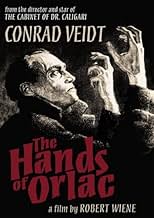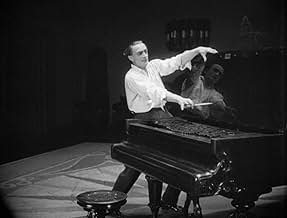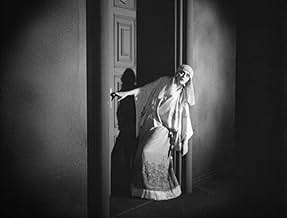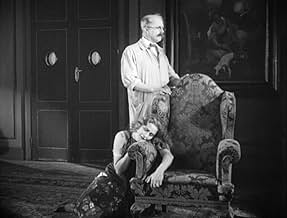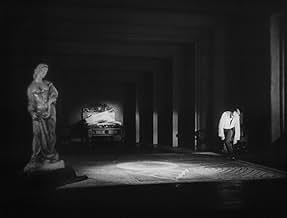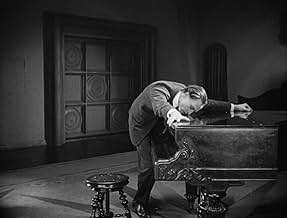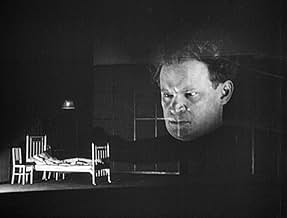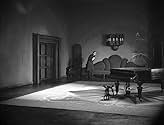IMDb RATING
7.0/10
3.7K
YOUR RATING
A world-famous pianist loses both hands in an accident. When new hands are grafted on, he doesn't know they once belonged to a murderer.A world-famous pianist loses both hands in an accident. When new hands are grafted on, he doesn't know they once belonged to a murderer.A world-famous pianist loses both hands in an accident. When new hands are grafted on, he doesn't know they once belonged to a murderer.
Conrad Veidt
- Paul Orlac
- (as Veidt)
Alexandra Sorina
- Yvonne Orlac
- (as Sorina)
Fritz Strassny
- Der alte Orlac
- (as Strassny)
Paul Askonas
- Der Diener
- (as Askonas)
Carmen Cartellieri
- Regine
- (as Cartellieri)
Hans Homma
- Dr. Serral
- (as Homma)
Fritz Kortner
- Nera
- (as Kortner)
- Director
- Writers
- All cast & crew
- Production, box office & more at IMDbPro
Featured reviews
I've been looking for a DVD of THE HANDS OF ORLAC ever since I knew the film existed. Now it's finally here, and like most silent films it's a mixed bag. I find the image on the new KINO disc to be acceptable considering the problematic nature of the source material. There's a loss of definition in some scenes, but there are also moments of sharpness in the restored Murnau Foundation print. It's a shame we can never experience non-talking films the way 1920s audiences did, without washed-out contrasts, image-flickers, frame-jitters, dirt, and print damage. Even the best restorations don't look new.
The plot concerns a concert pianist whose hands are smashed in a train wreck. A surgeon replaces them with the hands an executed criminal. Soon the pianist is obsessed with thoughts he might be a killer. The performances are generally excellent in the Expressionistic style. Conrad Veidt's exaggerated grimacing as his character Paul Orlac approaches madness is tempered by moments that are extremely moving.
The score of mostly string music on the KINO disc is creepy and works well for a while, but is so monotonous over the entire length of an already ponderously paced film that I grew tired of it. This film cries out for music that varies its mood to fit what is happening on screen. Contrasts in the mood of the music would make the creepy parts seem even creepier. An optional score in a traditional style would have been nice. Nevertheless, the Gothic set design and shadow-infested cinematography by Gunther Krampf - particularly the scenes at Orlac's father's house - create the atmosphere we know and love in early horror films. These chiaroscuro light-and-shadow effects just cannot be achieved with color.
However, to evoke fear without the modern cheats of gore and violence - to create what the Germans call "stimmung" (mood) - requires not only imaginative lighting and set design, but time. Unfortunately director Robert Weine spends too much time on the actors' very deliberate expressionistic movements at the expense of pacing.
The ending is likewise unsatisfactory, although it does follow Maurice Renard's novel. I won't give too much away other than to say the ending undercuts an apparently fantastic element, yet makes the "logical" explanation seem almost as implausible. Nevertheless, the build-up to the resolution as well as Veidt's engrossing performance makes this a worthwhile, if uninspired, film.
The plot concerns a concert pianist whose hands are smashed in a train wreck. A surgeon replaces them with the hands an executed criminal. Soon the pianist is obsessed with thoughts he might be a killer. The performances are generally excellent in the Expressionistic style. Conrad Veidt's exaggerated grimacing as his character Paul Orlac approaches madness is tempered by moments that are extremely moving.
The score of mostly string music on the KINO disc is creepy and works well for a while, but is so monotonous over the entire length of an already ponderously paced film that I grew tired of it. This film cries out for music that varies its mood to fit what is happening on screen. Contrasts in the mood of the music would make the creepy parts seem even creepier. An optional score in a traditional style would have been nice. Nevertheless, the Gothic set design and shadow-infested cinematography by Gunther Krampf - particularly the scenes at Orlac's father's house - create the atmosphere we know and love in early horror films. These chiaroscuro light-and-shadow effects just cannot be achieved with color.
However, to evoke fear without the modern cheats of gore and violence - to create what the Germans call "stimmung" (mood) - requires not only imaginative lighting and set design, but time. Unfortunately director Robert Weine spends too much time on the actors' very deliberate expressionistic movements at the expense of pacing.
The ending is likewise unsatisfactory, although it does follow Maurice Renard's novel. I won't give too much away other than to say the ending undercuts an apparently fantastic element, yet makes the "logical" explanation seem almost as implausible. Nevertheless, the build-up to the resolution as well as Veidt's engrossing performance makes this a worthwhile, if uninspired, film.
This is not a great movie, I admit. Certainly the acting is bizarre (though often moving) and the rhythm takes getting used to. But I thought I would put in a good word based on a recent viewing experience. I am not rating it high but I really enjoyed it a lot.
6 or 7 years ago I went on a Conrad Veidt spree and bought copies of some his silents from an ebay seller/devotee. The quality varied and I recall that he particularly apologized for this item, which was barely viewable. All you could really see was Veidt's face... The other night TCM showed the Kino restoration and I sat down to see the film "for real." It was a pleasure to be able to take in the wonderful decors and costumes, and to get a relatively coherent version of the plot. The train wreck scene is stirring. And Veidt's face, again, as he progresses from sensitive soul to tormented monstrosity... In short, it was very rewarding.
6 or 7 years ago I went on a Conrad Veidt spree and bought copies of some his silents from an ebay seller/devotee. The quality varied and I recall that he particularly apologized for this item, which was barely viewable. All you could really see was Veidt's face... The other night TCM showed the Kino restoration and I sat down to see the film "for real." It was a pleasure to be able to take in the wonderful decors and costumes, and to get a relatively coherent version of the plot. The train wreck scene is stirring. And Veidt's face, again, as he progresses from sensitive soul to tormented monstrosity... In short, it was very rewarding.
I'm glad I had this chance to check out yet another German Expressionist classic even if I had to make do with faint Spanish subtitles over the original German intertitles (then again, the narrative is easy enough to follow)! It took me some time to warm up to the film: the pace is extremely sluggish (the aftermath of the train-wreck at the beginning seemed interminable), while the all-important decision to exchange the damaged hands of famed concert pianist Orlac with those of a murderer felt too abrupt.
In preparation for this review, I re-read Michael Elliott's comments on the film: while I generally concur with his opinion, at this stage I wouldn't put this above the 1935 Karl Freund/Peter Lorre/Colin Clive remake MAD LOVE (Ted Healy's intrusive comedy relief, to me, is just about the only negative element in that film while adding Dr. Gogol's obsessive yearning for Orlac's wife, hence the new title). Still, I was surprised by how much the later film actually followed the Silent version especially the two scenes in which Orlac meets the 'executed' murderer of the Maurice Renard story; another remake appeared in 1960, co-starring Christopher Lee and which I watched on Italian TV not too long ago but already can hardly remember anything about it!
Conrad Veidt's lanky figure and stylized approach to acting perfectly suited the requirements of the leading role (his posture generally echoing that of Cesare the Somnambulist in the same director's THE CABINET OF DR. CALIGARI [1919]); the expressionist sets were also notable but the film's style is generally an internalized one in that it deals primarily with Orlac's state of mind filming him in tight shots whenever possible. However, the avant-garde score which accompanied the Grapevine Video edition I watched was a matter of taste featuring a female vocalist who frequently attempted to simulate the various characters' emotions with an annoying array of wails, shrieks and faint whispers!
It's unfortunate, too, that the backlog I have of unwatched films on DVD doesn't permit me to check out the Kino edition of CALIGARI for the moment especially since it contains a lengthy condensed version of another intriguing Wiene title, GENUINE: A TALE OF A VAMPIRE (1920)
In preparation for this review, I re-read Michael Elliott's comments on the film: while I generally concur with his opinion, at this stage I wouldn't put this above the 1935 Karl Freund/Peter Lorre/Colin Clive remake MAD LOVE (Ted Healy's intrusive comedy relief, to me, is just about the only negative element in that film while adding Dr. Gogol's obsessive yearning for Orlac's wife, hence the new title). Still, I was surprised by how much the later film actually followed the Silent version especially the two scenes in which Orlac meets the 'executed' murderer of the Maurice Renard story; another remake appeared in 1960, co-starring Christopher Lee and which I watched on Italian TV not too long ago but already can hardly remember anything about it!
Conrad Veidt's lanky figure and stylized approach to acting perfectly suited the requirements of the leading role (his posture generally echoing that of Cesare the Somnambulist in the same director's THE CABINET OF DR. CALIGARI [1919]); the expressionist sets were also notable but the film's style is generally an internalized one in that it deals primarily with Orlac's state of mind filming him in tight shots whenever possible. However, the avant-garde score which accompanied the Grapevine Video edition I watched was a matter of taste featuring a female vocalist who frequently attempted to simulate the various characters' emotions with an annoying array of wails, shrieks and faint whispers!
It's unfortunate, too, that the backlog I have of unwatched films on DVD doesn't permit me to check out the Kino edition of CALIGARI for the moment especially since it contains a lengthy condensed version of another intriguing Wiene title, GENUINE: A TALE OF A VAMPIRE (1920)
One of the real classics of Expressionism -- even the Americans think so, to judge from the fact that they've remade it (badly) several times. To be sure, the premise won't stand examination (but then, it's horror), and a modern viewer may find it hard to adjust to the actors' Expressionist grimacing. However, the movie is consistently suspenseful due to its heavy dark atmosphere and communication of mental torment. The fear of one's own body is a dynamite theme if it's as well presented as it is here.
Flirting with a (then) science fictional theme of body part transplantation, the film explores the feelings of a concert pianist, who having lost his hands in a train wreck, receives a new pair of hands that belonged to an executed murderer. Austrian director Robert Weine, who created the landmark 'The Cabinet of Dr. Caligari' (1919) here reunites with and directs its star, Conrad Veidt, as the tormented pianist Paul Orlac.
The camera focuses on Veidt's many moods and reactions to his plight -- his hands are not capable of his concert abilities, and he feels that they are taking him over with thoughts and deeds of crime and murder. He does an outstanding job, but too much of the film is slowly paced. From the beginning extended train crash rescue, on through scene after scene of Orlac's, his wife's and the maid's over the top Expressionistic gesturing, the scenes seem to go on too long.
This slow pace is exaggerated by the lack of camera movement (everything is mostly wide shots with little tracking), the wonderfully and effectively spooky new musical score (on the KINO 2008 version), that sometimes lacks verve and variety, as well as the extensive time spent on the actors' Expressionist movements.
The film certainly has its high points. It's great to see an entire film shot in shadows and low light, all with Gothic sets. This is great German Expressionism. If you can relax and just go with the pace of the film, you can really enjoy the acting of Conrad Veidt-- whose hands keep getting creepier and scarier.
If it were cut to about sixty minutes to pick up the pace, it would be easier to enjoy and to see the great care that went into its creation and execution.
I'll have to give it a six.
The camera focuses on Veidt's many moods and reactions to his plight -- his hands are not capable of his concert abilities, and he feels that they are taking him over with thoughts and deeds of crime and murder. He does an outstanding job, but too much of the film is slowly paced. From the beginning extended train crash rescue, on through scene after scene of Orlac's, his wife's and the maid's over the top Expressionistic gesturing, the scenes seem to go on too long.
This slow pace is exaggerated by the lack of camera movement (everything is mostly wide shots with little tracking), the wonderfully and effectively spooky new musical score (on the KINO 2008 version), that sometimes lacks verve and variety, as well as the extensive time spent on the actors' Expressionist movements.
The film certainly has its high points. It's great to see an entire film shot in shadows and low light, all with Gothic sets. This is great German Expressionism. If you can relax and just go with the pace of the film, you can really enjoy the acting of Conrad Veidt-- whose hands keep getting creepier and scarier.
If it were cut to about sixty minutes to pick up the pace, it would be easier to enjoy and to see the great care that went into its creation and execution.
I'll have to give it a six.
Did you know
- TriviaThis film was incomplete for decades, due to footage that never made it into the American prints and footage that had been cut due to censorship in German prints. The film was restored to its original length in 1995 by F. W. Murnau Stiftung.
- GoofsWhen Orlac reads a newspaper, the headlines are in German but the body in French.
- Quotes
Dr. Serral: The spirit governs the hand... nature and a firm will can do anything.
- Crazy creditsIn the opening credits, all cast members are billed by their last names only.
- Alternate versionsFirst released in 1924 in Austria and several months later in Germany, the original print ran to 2,507m (92 minutes). In June 1928, it premiered in the United States with an entire reel edited out which prompted a mixed critical reception. In 1995, the film was restored by Bundesarchiv-Filmarchiv in Berlin, Friedrich-Wilhelm-Murnau-Stiftung and the Deutsches Filminstitut with the co-operation of Jugoslovenska Kinoteka in Belgrad. This version had new music by Henning Lohner and was also given background noises and the sound effects of an interrogation scene of which was not universally approved. A new restoration was released on Region 1 DVD in 2008 by Kino Lorber which was based on the 1995 restoration and restored by Bret Wood, with a score by composer Paul Mercer and additional footage courtesy of The Raymond Rohauer Collection in Columbus, Ohio and took the running time to 110 minutes. In 2013 Filmarchiv Austria restored the film with material from its archives, running to 93 minutes. This had a score composed by Donald Sosin, performed by the composer at the piano and Dennis James at the Rieger organ. The 2013 restoration, with a score by Johannes Kalitze, was released on Blu-ray in Germany in 2019 and later in the United Kingdom in 2021.
- ConnectionsEdited into Histoire(s) du cinéma: Fatale beauté (1994)
- How long is The Hands of Orlac?Powered by Alexa
Details
- Release date
- Countries of origin
- Language
- Also known as
- The Hands of Orlac
- Filming locations
- Production company
- See more company credits at IMDbPro
- Runtime
- 1h 32m(92 min)
- Sound mix
- Aspect ratio
- 1.33 : 1
Contribute to this page
Suggest an edit or add missing content


